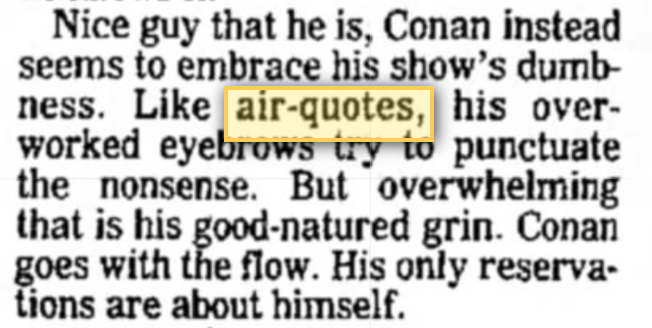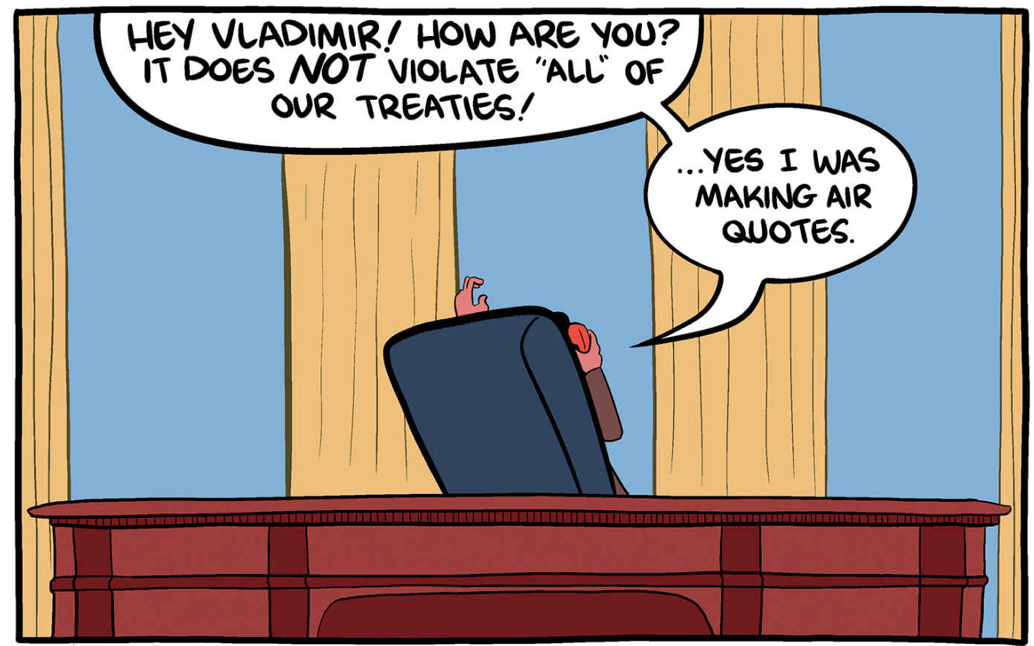Air quotes
« previous post | next post »
From Bill Robertson:
I’m reading my new copy of Soonish and came across a reference to air quotes and I got to wondering about the meme. I remember using them at least 30 years or more ago, entirely un-ironically. How does one go about looking up the history of such a thing? How would you reconcile the discoverable print references to its presumably earlier emergence as a metalinguistic thing in itself? At what point do the words, “air quotes” show up to stand for actual physically-performed “Air Quotes”?
The OED's gloss for "air quote" incorporates the connotation of irony:
n. orig. U.S. (usually in pl.) a pair of quotation marks gestured by a speaker's fingers in the air, esp. to indicate that what is being said is ironic, mocking, or disingenuous, or is not a turn of phrase the speaker would typically employ.
But the OED's entry also gives evidence that some people were miming two-fingered quotes in the air more than 90 years ago (though this seems to be a slightly different version of the gesture):
[1927 Science 8 July 38/2 Some years ago I knew a very intelligent young woman who used to inform us that her ‘bright sayings’..were not original, by raising both hands above her head with the first and second fingers pointing upward. Her fingers were her ‘quotation marks’ and were very easily understood.]
The OED's earliest actual "air quotes" citation is from 1989, and supports the "ironic, mocking, or disingenuous" connotation:
1989 Spy Mar. 94/1 When Bob and Betty describe themselves in these ways, they raise the middle and forefingers of both hands, momentarily forming twitching bunny ears—air quotes, the quintessential contemporary gesture that says We're not serious.
A bit of web search turned up an example from 1987 — Frazier Moore, "Conan better than Chevy after month", AP 3/24/1987
And another example from 1989 — Charles Brenner, "Caught in the grip of the smirk", The Times (London) 6/10/1989:
America is in the grip of the smirk, a relentless need to mock. From Manhattan dinner parties to the groves of Midwestern academe, they are dissecting this strange Zeitgeist of the late 1980s, usually tracing its origin to a moral drift, a pervading sense of cynicism or the 'post-modernist' sensibility. […]
Echoing the world of 'info-tainment', the whole of young America seems to have adopted the irony idiom. Listen to a group of teenagers and you get the impression they are spending all their time quoting. A trademark of the new youthspeak is the 'air-quote' a gesture of two raised fingers which insert quotation marks before and after a phrase, as in: 'Hey, this guy's, like (air quotes) totally excellent (close air quote).'
Interestingly, the two 1989 examples feel the need to explain the gesture, whereas the 1987 example just uses it.
Anyhow, the way it looks to me is that people have been miming quotation marks via hand gestures for a long time — at least a century. It's not clear to what extent this was independent invention as opposed to cultural transmission. And for at least 50 years, and probably more, quotation marks have been used in print as a distancing device. Thus the OED's gloss for "scare quotes" is
n. quotation marks used to foreground a particular word or phrase, esp. with the intention of disassociating the user from the expression or from some implied connotation it carries.
with citations from 1956 onward:
1956 Mind 65 3 The ‘scare-quotes’ are mine; Aristotle is not overtly discussing the expression ‘whichever happens’.
1960 P. T. Geach in M. Brand Nature of Human Action (1970) 119 Someone..might use ‘happy’, in scare-quotes so to say, to mean ‘what most people count happy, that is rich’.
The term "air quote(s)" itself, and the strong "ironic, mocking, or disingenuous" connotation, seems to have arisen in the mid to late 1980s. The fact that "air quotes" rhymes with "scare quotes" may have played a role in this transition.
By the way, the Soonish air quotes cartoon is this:
And the context is a discussion of why generating electricity by collecting heat from hydrogen bombs would be problematic:
But there are some problems. First, the container for the bomb would probably not survive the blast, making it hard to capture that energy. Second, even if the container did survive, it’d be incredibly irradiated. Third, if the container were imperfect, you might send a massive cloud of radioactive dust into the atmosphere.* Fourth, the Russian Embassy is calling, and they sound a little irritated on the phone.
Note that in this case the use of air quotes is not "to indicate that what is being said is ironic, mocking, or disingenuous, or is not a turn of phrase the speaker would typically employ", but rather to signal a type of stress and accent on the word "all", part of a larger prosodic pattern indicating that not takes scope over all (so that it's not the case the this power-generation method violates all of our treaties), while all is contrastive (implying that the method does violate some of our treaties). For discussion, see Mark Liberman and Ivan Sag, "Prosodic Form and Discourse Function", 1974.


Rodger C said,
October 23, 2017 @ 7:47 am
IIRC the first time I saw air quotes (the gesture, not the term) was as an undergraduate (1964-68), from a British guest speaker, in a non-ironic context.
Andrew (not the same one) said,
October 23, 2017 @ 8:17 am
I had believed that Lewis Carroll referred to the practice of making quotation marks in the air in Sylvie and Bruno; but on checking, I find that in that case it was not quotation marks but a parenthesis. That particular practice doesn't seem to have been taken up.
I take it that air quotes have the same ambiguity as printed quotes, which can be used either for actual quotation or as a distancing device, presumably because in the latter case there is an implication of 'as one might say'. It isn't always easy to distinguish the two uses; it's sometimes been proposed to use double quotes for actual quotation and single quotes for scare quotes, but people who try to do this keep coming up against cases where its not clear which they should use.
Sili said,
October 23, 2017 @ 9:44 am
Entirely unrelated I'm sure:
https://www.youtube.com/watch?v=lQ91SVKryYU
Jeremy Knight said,
October 23, 2017 @ 10:05 am
For those of us old enough to remember "charades" as a popular party game, the air-quote gesture was used to indicate that the item to be solved was a quotation. Wikipedia dates "acting charades" to before "the time of the First World War."
Toma said,
October 23, 2017 @ 12:19 pm
[…raising both hands above her head with the first and second fingers pointing upward.]
From this description, she probably wasn't using smart quotes. It seems most ironic uses of it now are with fingers bent–merely a product of electronic desktop publishing?
Justin said,
October 23, 2017 @ 12:41 pm
[A bit of web search turned up an example from 1987 — Frazier Moore, "Conan better than Chevy after month", AP 3/24/1987]
I haven't been able to find this article, but I assume it's from 1993 when Conan O'Brien and Chevy Chase both debuted new talk shows.
Laura Morland said,
October 23, 2017 @ 1:09 pm
Yes, Justin is correct: that 1987 date is much too early; Conan O'Brien wasn't even hired by Saturday Night Live until 1998, so he could not have had his own television show that long ago.
According to the folks at Wikipedia, as Justin points out, he and Chevy Chase did indeed debut their own talk shows in 1993. (Chevy Chase's show apparently didn't last the year.)
That would solve the "anomaly" of the lack of necessity to explain the term "air quotes."
[(myl) Interesting — so LexisNexis misdates things!]
On the point of the article, my 8th-grade science teacher was famous (among us kids) for making "bunny-ear quote marks," but she did it unironically. That was in 1968-1969.
JPL said,
October 23, 2017 @ 4:41 pm
I was under the (naive and scientifically unsupported) assumption that the expression "air-quotes" was formed on the analogy of the expression "air-guitar". But my position as an observer of such trends is not so reliable. Semantically, I was under the perhaps mistaken assumption that air-quoting was the droll speaking equivalent of the use of what are usually called "scare- quotes" in written discourse, and that this practice predated the use of the expression "air-quotes".
Electric Dragon said,
October 23, 2017 @ 4:56 pm
Stephen Fry and Hugh Laurie always used air quotes in "A Bit of Fry and Laurie" when mentioning the name of their show. In one sketch, Fry kills Laurie, and immediately seguing into an tribute segment commemorating the life of Laurie, refers to Laurie, with air quotes, as Hugh "Excellent Sermon Vicar" Laurie. At the end of the sketch, Laurie reappears dressed in a white suit, (referencing the ghost character Marty Hopkirk in 70s show "Randall and Hopkirk (Deceased)") and Fry then calls the show "A Bit of Fry and Laurie (Deceased)", with both air quotes and air parentheses.
https://www.youtube.com/watch?v=lccMNQxCmOc although this doesn't include the "(Deceased)" bit which I can't find on YouTube. Series 2 Episode 6, which aired April 1990.
Ray said,
October 23, 2017 @ 8:26 pm
I always think it's funny when quotes are used as italics or bold — to emphasize something, as really and truly — but they have the opposite effect. I recall a sign in my neighborhood years ago that always made me smile:
"DO NOT"
HONK HORN
tangent said,
October 23, 2017 @ 11:16 pm
Rather than emphasis, I read the cartoon "all" as a straight quotation of the word "all", after the other party had said "this violates all of our treaties."
Chas Belov said,
October 24, 2017 @ 12:23 am
Another non-ironic British usage of air quotes with context from 0:50-0:58 https://www.youtube.com/watch?v=mlgRrbVh4PI to define "catchy."
Karly said,
October 24, 2017 @ 9:34 am
Usually taken out of context but amusing none the less. "Catchy"
Athel Cornish-Bowden said,
October 25, 2017 @ 11:40 am
When my daughter was 5 she was fluent in English and French (and Spanish), at the level of a 5-year old, but her French was the one she knew best, because that's what she used with her friends at school. When she was talking to me in English she sometimes needed a word she knew in French but not in English, and she would insert a French word in an English sentence. When she did that it was perfectly obvious that she realized that it wasn't an English word, because you could "hear" the quotation marks in the form of very short pauses before and after the inserted word.